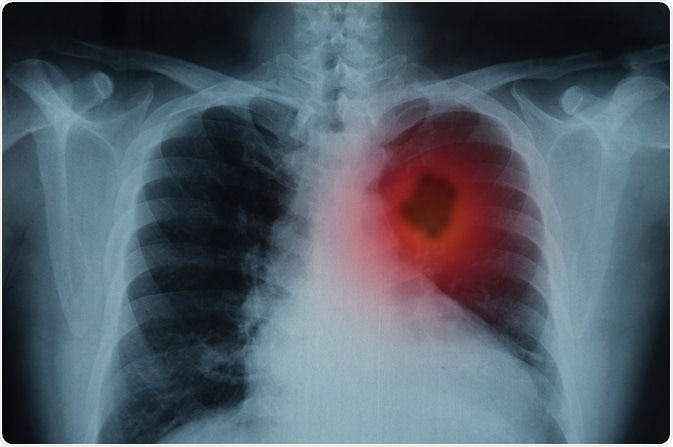Researchers at Massachusetts General Hospital (MGH) have successfully identified metabolic biomarkers able to determine between the different major subtypes of lung cancer and distinguish the stage of lung cancer.

Image Credit: Create Jobs 51/Shutterstock.com
In a paper published in Scientific Reports last July, the team describes how they used the technique of magnetic resonance spectroscopy to identify these new biomarkers that could potentially help doctors decide what treatment is best suited to individual patients, hopefully having the impact of improving treatment outcomes.
A need for a safer tool to screen for lung cancer
Currently, those of middle-age or older who have a history of smoking are advised by the US Preventive Services Task Force to undergo annual lung cancer screening with low-dose computed tomography (CT).
However, while low-dose CT has proven itself to be an effective technique for identifying the presence of small lung tumors, it is expensive and also puts patients who undergo repeated scans at risk of the potential detrimental effects of radiation exposure.
Therefore, CT is prevented from safely being used as a widespread screening tool to assess the general population. There is a need for a low-cost method that doesn’t carry the potential health risks associated with repeated CT. The development of such a method would potentially result in lung cancer being detected at earlier stages when it is easier to treat.
For this reason, the team at MGH embarked upon a journey to develop a tool that uses biomarkers from blood samples to detect the presence of lung cancer, which would offer a minimally invasive way of screening people, without exposing them to radiation.
If established, this technique could offer doctors a tool for helping to decide which type of treatment is more likely to be suited to each individual patient.
Using MRS to compare blood samples and tumor tissue
The team searched for unique metabolomic markers of tumors by comparing blood samples along with tumor tissues that were taken at the same time. This used magnetic resonance spectroscopy (MRS) to define the composition of the samples.
MRS has previously been used to determine potential biomarkers of lung cancer in the blood, however, the current study was unique in that they were comparing the blood against paired tumor samples taken at the same time.
A total of 42 patients with squamous cell carcinomas (SCC) of the lung and 51 patients with adenocarcinomas of the lung participated in the study.
In addition, 29 volunteers were studied as a control group. Of the clinical group, there was a mixture of those with early (Stage I) lung cancer and more advanced stages (II, III, or IV) of the disease.
Experiments were set up to identify common features between the tumor tissue and the blood samples taken from the same patient. The aim was to find biomarkers that could reliably determine the presence of lung cancer, the subtype, and stage of cancer, which would open the door to developing a simple blood test to ascertain these factors.
Biomarkers determine presence, subtype, and stage of lung cancer
Biomarkers that can accurately determine the presence of lung cancer, and classify the subtype and stage of cancer were established by using MRS to investigate the blood samples and tumor tissues. The results showed that the biomarkers could reliably predict the survival rates of the patient that the samples came from.
To achieve this, the team established profiles of metabolites that they found to be common between the blood and the tissue samples. They then distinguished the differences in these profiles that were related to the presence of SCC or adenocarcinoma.
These two different subtypes require different treatments, so distinguishing between the two is essential for informing on treatment plans. In addition, they used the profiles to determine the stage of the disease.
Finally, the tests proved accurate in determining whether a sample had been taken from a patient who lived longer or shorter following surgery, therefore, meaning that it could identify those at high risk for early death.
A blood test for lung cancer?
In the future, scientists may be able to develop a blood test based on these biomarkers to help screen for lung cancer, as well as assisting physicians in deciding on the most appropriate treatment plan. However, further research is needed before this can be established.
Sources:
· Berker, Y., Vandergrift, L., Wagner, I., Su, L., Kurth, J., Schuler, A., Dinges, S., Habbel, P., Nowak, J., Mark, E., Aryee, M., Christiani, D. and Cheng, L. (2019). Magnetic Resonance Spectroscopy-based Metabolomic Biomarkers for Typing, Staging, and Survival Estimation of Early-Stage Human Lung Cancer. Scientific Reports, 9(1). https://www.nature.com/articles/s41598-019-46643-5#citeas
· Kovalchik, S., Tammemagi, M., Berg, C., Caporaso, N., Riley, T., Korch, M., Silvestri, G., Chaturvedi, A. and Katki, H. (2013). Targeting of Low-Dose CT Screening According to the Risk of Lung-Cancer Death. New England Journal of Medicine, 369(3), pp.245-254. https://www.nejm.org/doi/10.1056/NEJMoa1301851
Further Reading
- All Cancer Content
- What is Cancer?
- What Causes Cancer?
- Cancer Glossary
- Cancer Classification
Last Updated: Feb 7, 2020
Source: Read Full Article